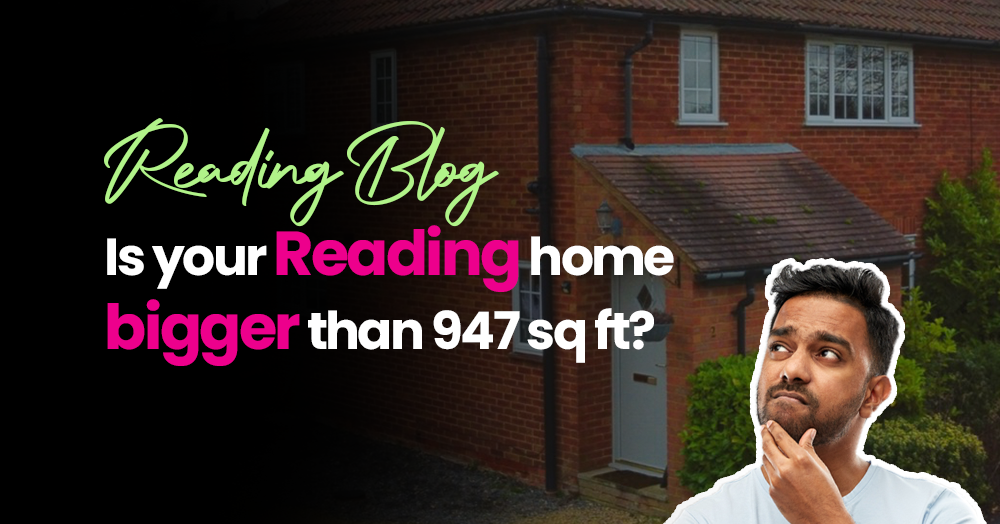Is your Reading home bigger than 947 sq ft?
Reading Homeowners - Do you know how big your Reading home is?
What is the square footage of your Reading home?
Don’t worry, most of us don't - yet it could be fundamental as Reading home buyers search for new homes.
Us Brits are obsessed with our homes, yet most Reading homeowners need to learn the square footage (those born after the mid-1970s) or square metre(age) of their homes.
As an agent, I find homebuyers usually assess the size of their intended house purchase chiefly by the number of bedrooms the property offers. However, could we all make more effort to calculate how much actual space we require in the home outside the number of bedrooms?
Let me see how the properties locally are split down regarding bedrooms.
The split of bedrooms in Reading is as follows:
· 16.7% of properties have one bedroom compared to the national average of 10.7%
· 29.0% of properties have two bedrooms compared to the national average of 26.7%
· 36.0% of properties have three bedrooms compared to the national average of 40.6%
· 18.4% of properties have four or more bedrooms compared to the national average of 22.0%
As one would expect for our location in the UK, we have a higher number of 2 and 3-bedroom homes in our locality.
So, are more bedrooms better? Not necessarily.
Unless you are buying a Reading property to develop and then sell on straightaway, I believe it is imperative to enjoy your property for what it was designed to be – your home.
Though room for growth and resale ability potential of the house purchase is vital, the manner of the way you and your family live and how you use your home must be the primary consideration for improving your quality of life. And because of this …
I have noticed a slight change in how Reading buyers (and tenants) have been asking and enquiring about property in the last 18 months.
The first is asking for a property’s energy efficiency rating. This can be seen on the property’s Energy Performance Certificate (EPC). That was expected, with the rise in gas and electric bills.
Yet the second is that more and more Reading tenants and buyers are asking about the size of the property, which can be found in the EPC mentioned above.
Talk in the property industry suggests a move towards home movers wanting homes with minimum square footage instead of a property with a particular number of bedrooms.
I am noticing mature Reading homeowners who are downsizing are asking for the size of a property, as they require fewer yet large rooms.
Should we all consider how we use our space in our Reading homes before we decide to move? Before we do, let’s look at the average sizes of the properties locally.
These are the averages for the Reading area.
· The average size of a house is 1,033 sq. ft. compared to the national average of 1,103 sq. ft.
· The average size of a bungalow is 882 sq. ft. compared to the national average of 862 sq. ft.
· The average size of a flat/apartment is 441 sq. ft. compared to the national average of 464 sq. ft.
· The average size of a maisonette is 570 sq. ft compared to the national average of 657 sq. ft.
· The overall average is 947 sq. ft. compared to the national average of 994 sq. ft.
Again, as I would expect due to our location, the average home is slightly smaller than the national average.
In the last few years, with lockdowns, as a nation, we have started to use our homes differently.
Rooms in our homes have become interchangeable - having more bedrooms isn't automatically the status symbol it once probably was.
Spare bedrooms have become offices, dining rooms have become gyms, and so on.
Are you willing to sacrifice living room space for an extra bedroom, even if it makes the living room feel cramped and uncomfortable?
Before selecting a home based solely on the number of bedrooms it offers, there are several factors to consider.
Evaluate your current living space and how you use it.
Determine if you utilise all the rooms to the best of the space available, if you have enough storage, and if the layout works for you. If you value space and openness, prioritise square footage instead of bedrooms.
Consider your current life stage and living space needs. If you have a family, bedrooms may be a priority, but assessing how many are needed is essential. It would help if you also considered whether you need a separate space for work or a top-of-the-range ensuite.
If you plan to rent out your Reading property, the number of bedrooms is crucial.
However, it is essential to consider the type of Reading tenant you want to attract and what type of space would be most marketable.
Instead of moving to a new Reading home, renovating your current space might be a better option?
By reconfiguring the space or extending it, you could improve your quality of life or increase the value of your Reading property. A home makeover could give you the open space or environment you desire?
By answering these questions, you can determine whether the number of bedrooms, other rooms, or square footage is the most crucial factor when selecting a new home.
What do you think?
If you are a Reading homeowner or property buyer and you want to pick my brains on your best options,
get in touch here.

